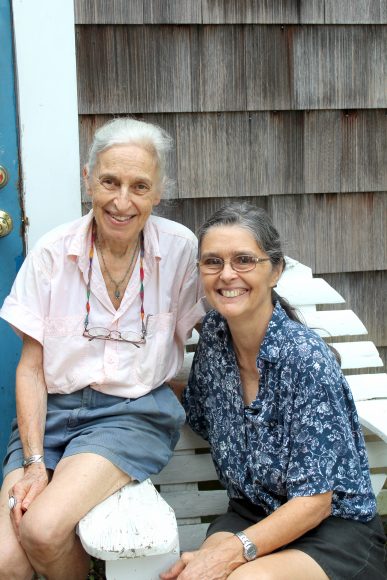Always on the hunt for interesting restaurants in coastal Connecticut that complement my own particular eating regimen, you can imagine my delight when I discovered the 42-year-old Bloodroot in Bridgeport.
A simple search led me to this hidden, beloved gem that is both a vegetarian restaurant — now vegan for about the last three years — and feminist bookstore rolled into one enchanting establishment.
If not for the colorful, seaside landscape, you would think, based on the feel-good, natural vibe upon entering, that you had stepped into a haven tucked away on a quiet corner in Greenwich Village. Equally engaging are its proprietors, Selma Miriam and Noel Furie, two of the small band of feminists who originally set forth to open a women’s center on this site at the height of the women’s movement of the 1970s; the bookstore and restaurant followed.
“For us it’s not a movement,” Furie says during our formal sit-down in the garden overlooking the peaceful inlet of the Long Island Sound where Bloodroot is perched just opposite Captain’s Cove. “Everything we do is under the umbrella of feminism and is consistent with our values.”
Cruelty of any kind, but particularly toward other living creatures, contradicts their mission to uphold the rights of those who have suffered abuse. They oppose the values of patriarchy, don’t want to see animals or women enslaved or the planet destroyed. They see the imbalance in nature — on the land and in the seas — and believe that following a plant-based diet will help to restore it.
With their shared passions for animals, nature, cooking and feminist literature, this duo has amassed a loyal following, and in my two recent visits — once for Saturday dinner and again for Sunday brunch — I easily see why. Along the way, at each turn and tweak of Bloodroot’s original, creative menus, they have attracted newcomers and longtime fans alike who revel in their thoughtful and caring approach to producing tasty, delicious and lovingly prepared eats. Furie points to a simple house-made poster at the open-kitchen window where the countries of origin of their clientele are listed and continually updated. There are more than 100 nations on the list.
Upon opening the doors at meal times, a patient line of customers forms at the entryway and all are welcomed, usually by Miriam, who also takes their orders. They are the real deal — Miriam and Furie, producing vegan cuisine at perfectly wonderful heights, and sharing their formulas generously. Over the years many cookbooks — vegetarian and now vegan — have been produced including artful calendars with seasonal recipes and inspirations, with all accompanying photography by the talented Furie.
“We don’t keep our recipes a secret,” Miriam says, “we believe in keeping them simple and sharing them for others to create.”
An array of house-made breads — Furie has perfected and produces the legendary whole wheat and the oatmeal, while Miriam is in charge of the sourdough potato rye — are included with many of the offerings on the menu. The more senior of the two, Miriam, seems to take the lead, but clearly Furie is no slouch in the kitchen either. “She’s the instigator,” Furie says of Miriam. Both are inspired by natural and unusual ingredients and finding new methods for producing dishes representative of other lands and cultures. This practice is mostly fueled by the female cooks who gravitate to them, to suggest and share their expertise and native ingredients to make flavorful, vegan dishes.
Take the carrot “lox” offered with vegan cream cheese atop one of the delicious baked breads for Sunday brunch. “Someone had scribbled a basic recipe on a piece of paper,” Miriam says, “and eventually I wanted to get rid of that piece of paper, so I got around to playing with it.” Through her characteristic trial-and-error approach, she mastered the process of steaming long ribbons of carrots, adding her own unique method of doing it over sheets of wakame — the seaweed imparting the fishy flavor and the process producing the proper texture and taste once the liquid smoke and seasonings are applied.
“I love lox,” Miriam says, “and I never thought that it could be replicated in a vegan form, but it can.”
For my Saturday dinner I had the Jamaican jerk “chicken” with the perfectly crafted, authentic habanero-based jerk sauce applied during the cooking process and served as a side with flavorful rice and beans, steamed sweet potatoes and avocado slices. It’s appropriately and highly seasoned with a good amount of heat, as I am warned by Furie when I collect my plate at the kitchen window. I finish it off with room to spare for Miriam’s banana-nut cake, not too sweet and perfectly moist.
It’s the skill of execution and passion for bringing it that is packed into every dish — the mushroom and walnut pâté I had as a starter has a substantial structure and harmonious flavors, making it a favorite of their diners and a staple of their repertoire. Also offered as a starter or finisher is a nut-based cheese plate. Both of these dishes pair well with wines offered by the glass or bottle at a reasonable charge — as are craft beers and other interesting nonalcoholic beverages.
A latecomer to the kombucha-craze, at brunch I chose GT’s Gingerade, with its refreshing effervescence complementing my flavorful and rich mushroom quiche. “There’s Forager (plant-based) yogurt in it — that’s what makes it so creamy,” Furie says. The crust — also used for their blueberry pie that debuts in the summer when their own crops of these power berries are at their peak — is golden, flaky perfection. Miriam developed it using basic ingredients she rattles off to me, and coconut oil subbing for the “lard,” producing golden, flaky perfection. I tell Miriam I am intimidated by making pastry and piecrusts and she quickly dismisses my concerns. “It’s so easy,” she says.
There is nothing commercial about this enterprise. There is no restaurant furniture — instead an assortment of vintage desks, tables, chairs and accessories acquired over the years lend a warm and relaxing ambiance.
“Some of the best things we ever did were experiments,” Miriam says. “We have no waitstaff — that was intentional from the start. We have cooks, not chefs.”
It’s a culinary experience to be enjoyed for all, whether you keep strictly vegan or just want to embrace meatless days and try some of their flavorful culinary creations.
The natural grounds and casual picnic tables invite lingering and savoring the food and landscape alike. Furie says that Miriam, a former landscape designer before this passion project ensued, designed the property’s gardens. They grow an array of fresh herbs, tomatoes, peppers and two bumper crops — baby eggplants and blueberries — prominently featured in their seasonally inspired cuisine during the warmer months.
A mature weeping cherry tree and a majestic pine sit at two corners of the yard and frame the shingled New England-style structure. Inside are many of Furie’s photographs of the property at the time they started developing it in the late ’70s, and on a level just above the dining room is the bookstore cum library just “because we like to read,” Miriam says. There’s also a “Mermaid Room” for reflection and relaxation whose corner windows encase the idyllic scene outside.
As we wind own our visit, allowing them to complete the day’s tasks to prepare for a well-earned Monday off, I regretfully prepare to take leave of these women who already feel like old friends. Miriam asks if I would like to take some sourdough starter, the not-so-secret ingredient that lends the moistness to their iconic chocolate devastation cake.
The shared “herstories” of Miriam and Furie are delightful to hear — were that we had the luxury of time for all the telling. It would be a treat to cook alongside these two in their inviting kitchen, or occupy the Mermaid Room for about a fortnight in order to hear more tales, but I’ll just have to return again and again to see what these two wise, wonderful women are cooking up in this bucolic New England mainstay.
For more, visit bloodroot.com.


